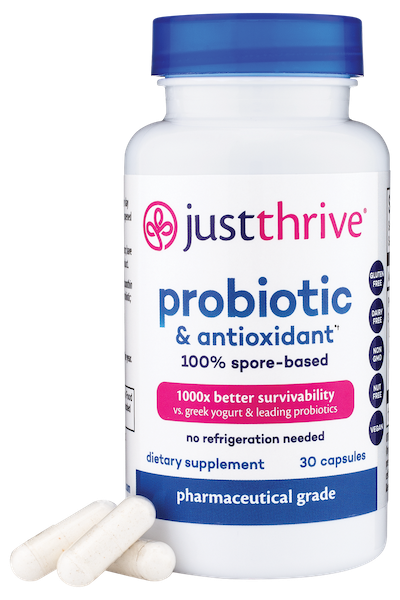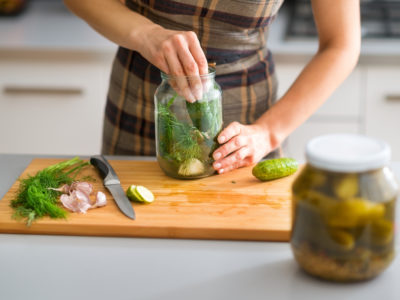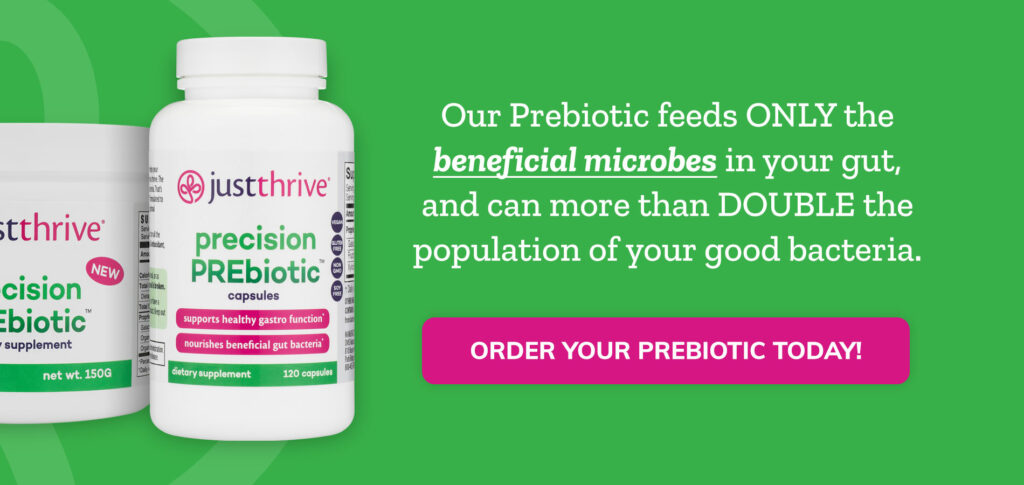Table of Contents[Hide][Show]
Are Gut Microbes Friends or Foes?
The Human Microbiome Project, funded by the National Institute of Health, has delved down into the microbiology of the human gut. The project found out there are host-microbiome interactions that can be protective or detrimental to human health.
The human microbiome consists of both beneficial bacteria (probiotics) and harmful bacteria (pathogens). When a disruption to the microbial balance occurs, this is called dysbiosis.
Many health experts postulate that dysbiosis is the root cause of numerous health conditions. Disease states associated with microbiome dysbiosis include:
- Obesity
- Insulin dysregulation
- Candidiasis
- Leaky gut syndrome
- Autoimmunity
- Cancer
- Diarrhea
- Irritable bowel syndrome
- Ulcerative colitis
- Crohn’s disease
The types and amounts of beneficial and harmful microbes surviving in the gut depend on many factors, such as the following:
- Types of foods consumed
- Antibiotic/drug use
- Toxic chemical exposure
- Infections
- Heavy metal load
- Environmental exposures to microbes
Microbial supplements, known as probiotics, can be used to repopulate the gut with beneficial strains of bacteria. While these can be extremely beneficial for gut health, it’s important to note that not all probiotics are created equally. The vast majority of probiotic supplements on the market are ill equipped to survive the journey from your mouth to your gut… And if a probiotic can’t make it to your gut alive and intact, it can’t provide much benefit.
Spore probiotics have been shown in multiple clinical studies to be the best for your gut. Bacillus strains such as Bacillus indicus, Bacillus coagulans, and Bacillus clausii are effective is because “the endospores that encapsulate the strains are highly resistant to stomach acid, potentially resulting in the delivery of more viable probiotics to the intestine.”
A Proven, Potent and Effective Spore Probiotic to Help You Feel Your Best
Just Thrive’s breakthrough, award-winning probiotic contains the proprietary strain, Bacillus indicus HU36®, which produces antioxidants directly in the digestive system where they can be best absorbed by your body.

Fermented Foods
You can also boost the beneficial bacterial populations in your gut by eating fermented foods. Try incorporating some of these probiotic-rich foods into your diet along with the prebiotic foods mentioned later in this article for improved gut health.
- Pickles
- Sauerkraut
- Kimchi (of Japanese origin, similar to sauerkraut but spicy)
- Yogurt
- Kefir
- Natto
- Tempeh
- Kombucha
- Sourdough bread
- Miso
What Are Prebiotics?
Before we discuss the prebiotic benefits for the gut, it is important to know what they are first.
Prebiotics are a specialized type of plant fiber that passes through the small intestine, but they are not digested. Most prebiotics are soluble fibers. These specialized fibers—created via a natural fermentation—are the “food” for your beneficial gut bacteria, helping to provide several benefits (which we’ll discuss below). Additionally, they can help boost short-chain fatty acids, which are shown to maintain a healthy colon lining. If you are constipated, the insoluble prebiotic fibers can help add bulk to your stool. This allows for food to move more easily through your gut and out of your body.
The fermentation that creates prebiotics also produces an acidic milieu that protects you from harmful bacteria that may result in Crohn’s, IBS, or ulcerative colitis.
Related
6 Things Your Poop Color Is Telling You About Your Gut Health
Your poop color might just hold the answer to how healthy your gut is. Know what the color of your stool is telling you here!
How Prebiotics Can Benefit the Gut
Now, let’s examine the enhancing effect of the fibers known as prebiotics.
Prebiotics feed your beneficial gut flora, helping them proliferate and flourish so that they may confer numerous health benefits to the body.
These increased numbers of healthy bacteria crowd out undesirable bacteria and other microorganisms. The resulting balanced microflora brings the pH of the gut to the ideal level.
This allows for the accelerated healing processes and optimization of the gut-associated lymphoid tissue, which is a large portion of your immune system.
The healthier your gut, the more minerals can be absorbed, thus positively influencing your overall health. For example, calcium absorption and bone density have increased with prebiotic supplements.
When gut microorganisms metabolize prebiotic fiber, they create butyric acid (butyrate), a short-chain fatty acid that helps heal our gut lining. You may have heard of butyric acid, the compound that gives butter its distinctive flavor.
The butyric acid comes from the microbial breakdown of grasses the cow eats.
Another prebiotic that benefits the gut is pectin. This soluble fiber found in certain fruits helps your digestive system with its unique gelling properties. This gel helps move substances along the digestive tract, which helps reduce constipation. It also has anti-inflammatory properties, can improve blood sugar and blood fat levels, and can form a protective layer around your gut to keep bad bacteria out. However, it has been known to cause some gas or bloating in some individuals, so like anything, consume this fiber in moderation.
Prebiotics bring about a beneficial change in the gut microbiota composition. Studies show positive effects on markers associated with the immune function, allergies, satiety, infections, stool quality, bowel disease, and cancer.
Prebiotics and other specific food components may also change gene expression in various tissues, improving gut function, immunity, and body composition.
Add more prebiotics to your diet to help address or avoid the following:
- Allergies
- Immune problems
- Obesity
- Bowel disease
- Mineral deficiencies
- Infections
- Gut dysbiosis
- Cancer
Prebiotic Foods & How to Add Them to Your Diet
Aside from supplements, you can also get soluble fiber, vitamins, and antioxidants from certain food sources. These are some of the best prebiotic foods for your health.
1. Onions
Onions are usually present in our daily recipes, and they possess fructooligosaccharides (FOS), a sweet carb typically used as a sweetener because of its low-calorie content compared to sugar. This carb strengthens the gut ecosystem by changing its microbial composition.
2. Leeks
Leeks come from the same family as garlic and onions, providing similar health benefits. They possess inulin, a starchy substance commonly present in herbs, fruits, and veggies that’s used in medicine for treating diarrhea and constipation.
The stomach does not absorb inulin; it instead goes to the bowel. The good gut bacteria use it for their growth. This leads to improved bowel function which can aid in your weight loss journey.
3. Garlic
Garlic naturally gives a tasty flavor to all sorts of dishes, and it contains 11% inulin and 6% FOS. This vegetable serves as a prebiotic that promotes the growth of the good bacteria called Bifidobacteria in the gastrointestinal (GI) tract.
Garlic—especially in its raw form—is also often hailed for its antibiotic and immune boosting properties. It helps prevent disease-promoting bacteria or bad bacteria from thriving in the GI tract.
In addition to its immune and gut health benefits, garlic can be especially important for those who are pregnant in lowering the risk of spontaneous preterm delivery. A 2013 study in the Journal of Nutrition concluded that the “intake of food with antimicrobial and prebiotic compounds may be of importance to reduce the risk of spontaneous PTD. In particular, garlic was associated with an overall lower risk of spontaneous PTD.”
4. Chicory Root
The chicory root is known for its similar taste to coffee, in addition to being a good source of prebiotics. It has 47% inulin, which aids in digestive health and constipation relief.
5. Jerusalem Artichokes
Also known as sunroot, sunchoke, or earth apple, Jerusalem artichokes have about 2g dietary fiber per 100g, 76% of which is from inulin. A study showed that this root vegetable enhances the growth of healthy gut bacteria more than chicory root.
6. Dandelion Greens
Dandelion greens are rich in fiber, containing 4g per 100-g serving and a bigger portion of the fiber is from inulin.
7. Jicama Root
What makes this root wonderful is its high levels of fiber, including inulin, and low levels of calories. Aside from that, it also possesses high amounts of water essential in promoting proper bowel movement. It’s also rich in vitamin C, which is good for the immune system.
8. Asparagus
This popular veggie is packed with nutrients and prebiotics. Its inulin content is roughly 2-3g per 100-g serving, which helps promote the development of good bacteria.
9. Legumes
Legumes such as beans, seeds, and lentils are rich in prebiotic content. Beans are particularly high in protein and potassium as well, and flaxseeds are a great source of the soluble fiber, pectin.
10. Whole Grains
Gluten-free whole grains such as quinoa, brown rice, buckwheat, barley, and oats not only support a healthy gut, they can also improve your heart function and mood. The best whole grain sources of prebiotics are buckwheat and oats. Whole oats are especially good for helping regulate cholesterol levels as they contain the soluble fiber, beta-glucans. Oats are also rich in resistant starch, which is good for gastrointestinal issues like bloating.
Prebiotic Supplements
In addition or instead of these prebiotic foods, you can try prebiotic supplements which come in powdered or pill form. These may also be a good alternative for you if the foods above cause gastrointestinal distress for you. For example, the specially selected and clinically-tested fibers in Just Thrive Precision PREbiotic has been shown to offer soothing, gastrointestinal support.
Closing Thoughts
Prebiotics are indeed an essential fiber needed for the promotion of a healthy digestive tract and your overall health. You only need to know and understand what the fiber does in your body so you can prioritize it in your diet.
Prebiotic sources can come from prebiotic supplements or foods. If you’re unsure how you should consume it, consult a dietician for proper nutritional guidance.
You May Also Like…
Sources for this article:
- NCBI-NLM Gut Microbiota Modulation
- NCBI-NLM Modulation of the Gut
- NIH Human Microbiome Project
- NCBI-NLM Prebiotic Effects
- NCBI-NLM Gut Microbial Mutualism
- Healthline
- NCBI-NLM The Effects of Insulin
Editor’s Note: This post was originally published on June 12, 2017, and has been updated for quality and relevancy most recently on July 20, 2021.






